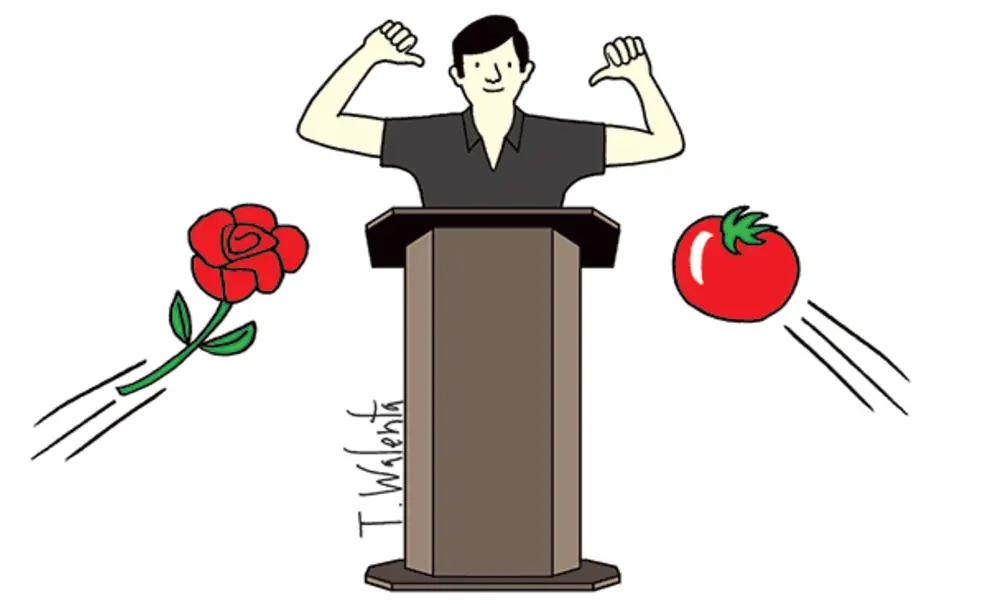Amid Controversy, Shkreli Pays a Visit
Former hedge-fund manager and drug-company CEO Martin Shkreli may have been described as “the most hated man in America” in 2015 after raising the price of the infection-fighting drug Daraprim 5,000 percent. But students listened respectfully and laughed at his one-liners during an April 28 campus talk.
When Shkreli spoke at Harvard in February, students protested outside and set off a false fire alarm. A planned January talk at Princeton was canceled after the E-Club withdrew its invitation. But the student Corporate Finance Club stepped in with its own invitation, and tickets for all seats in McDonnell Hall’s lecture hall were reserved in advance.
Why sponsor Shkreli’s appearance, whose trial on federal securities-fraud charges was scheduled to start in June? He is “well-versed in the pharmaceutical investment industry,” club president Benjamin Lei ’18 explained. “We wanted to hear his thoughts on drug-pricing and business strategy.”
Shkreli began his speech by presenting a geometry proof and promising to pay the tuition of any student who could solve it. Numerous students handed their solutions to Shkreli, who said he would have the responses reviewed by a math professor.
Shkreli’s responses were a mix of humor, self-aggrandizement, condescension, and occasional defensiveness.
Shkreli said he hoped to dispel “myths” about him, adding that “a lot of people think that I just woke up one day and decided to be the world’s worst person.” He argued that his business decisions are part of his belief that high drug prices reflect the usefulness of medications. “The more utility something provides you, the more expensive it should be,” he said.
Then it was the students’ opportunity to ask questions: Why does he place higher prices on drugs than other pharmaceutical companies do? Why does he spend so much time on social media? Why did he purchase hip-hop group Wu-Tang Clan’s music album for $2 million?
Shkreli’s responses were a mix of humor, self-aggrandizement, condescension, and occasional defensiveness. Asked if physicians are as important as pharmaceuticals, he replied, “I think that 90 percent of doctors don’t need to exist.” At the end, following applause, he invited students to join him for a beer at a local pub.
Not all students were pleased by the event. The day before the talk, The Daily Princetonian published an opinion piece by Crystal Liu ’19 headlined “Disinvite Shkreli (again).” Liu said the issue was not free speech, but Shkreli’s morally questionable practices. “Whether you agree or disagree with Shkreli, engaging him indirectly supports him and his views,” she said. Shkreli responded in The Prince that Liu’s argument was “as intellectually bankrupt as a Trump casino.”

Not all students were pleased by the event. The day before the talk, The Daily Princetonian published an opinion piece by Crystal Liu ’19 headlined “Disinvite Shkreli (again).” In her article, Liu said the issue was not free speech, but Shkreli’s morally questionable practices. “Regardless of whether you agree or disagree with Shkreli, engaging him indirectly supports him and his views,” she said. In a response published in the Prince, Shkreli called Liu’s argument “as intellectually bankrupt as a Trump casino.”
Chiara Ficarelli ’19 said Shkreli “came off very arrogant. I definitely think there’s value to bringing diverse speakers that represent different thoughts, but I don’t think we should bring someone who’s being charged with a crime. It doesn’t represent the kind of moral and intellectual thought we value at Princeton.”
A version of this story was published online May 9, 2017.












No responses yet